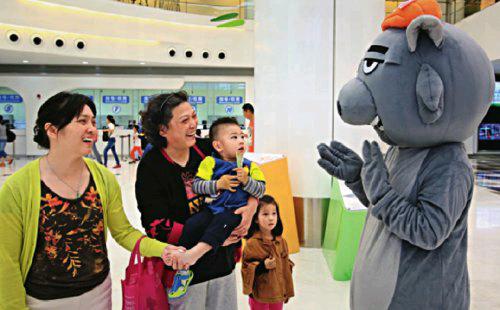The Most Important Investment under the“New Normal”
By+KERRY+BROWN
OVER the last 30 years, per- haps the most significant capital that the Chinese government has accrued is not the trillions of dollars worth of foreign exchange reserves in its central bank, or the value of fixed assets that so much investment has gone into. The most important capital it owns is in the form of reputation capital with the public, gained through the continuously brisk GDP growth since 1980. Like a saver depositing cash in the bank, throughout this period the Chinese government has been converting GDP into public confidence and saving that.
This was necessary, because economists and planners knew that one day Chinas stellar GDP figures would diminish. The laws of sustainable development, as Chinese Premier Li Keqiang said in his March 5 government work report, preclude using resources and investing as heavily as one once did. Things have to change. New spaces for growth have to be found. The challenges to a developing economy are quite different from those of a developed one. Thats just the way things are.
The “new normal” in China, therefore, where growth is approximately seven percent, is, according to this years National Peoples Congress (NPC) session, one where the battleground shifts from raw GDP to better productivity, better quality growth, employment, and entrepreneurialism. This is a hybrid list, and can only work in an environment where, as Premier Li made clear, there are clear rules that ensure everyone knows how to work together. Also where there is a looser government role, more input from the non-state and entrepreneurial sector, and a greater appetite for controlled risk.
The regulatory framework is the key issue, one that the NPC has spent some time discussing. In the recent past, risk was controlled mostly by the central government. There were clear prohibitions against taking too many chances, and strong controls through the fiscal and administrative system. But now China needs to embrace an era of innovation and adventure. To achieve this, more power needs to be devolved to local governments. Rules need to be clearer, simpler and easier to implement. Everyone needs to have a clear idea of exactly what the powers and responsibilities of other parties are. Once all that is in place, people can then start to invent, devise, and propose new ideas and approaches. In theory, that is how a creative society should work.
This years NPC session acted partly as a process of devising a new, clearer government role. Markets, which are well regulated, need increasingly to set the prices for factors of production. Consumers need to find alternatives to fixed asset investment as the key driver of economic growth. And the service sector will rise, replacing manufacturing where prices are low and input costs are rising, so enabling the urban, modernizing economy to come more rapidly into existence. The government has to be the servant in all of this by withdrawing from some areas, but making sure before it does so that there are clear rules and regulations, and that a system is in place to implement them.endprint
One of the tactically most important shifts we can see in this “new normal”paradigm as outlined in this years NPC is greater investment in and efforts towards human capital. Education and healthcare receive special attention, as does improving Chinas environment. All are critical to human development, and also increasingly producers in their own right of better quality GDP.
Education will produce 7.5 million new college graduates in 2015 — three quarters of the amount of new jobs that Premier Li promised would be created this year. In a short space of time, therefore, China is seeking to own one of the best educated young work forces in the world. Environmental protection means better technology, more investment in research, and more clean industries.
Healthcare, too, with its extension to community centers available to 95 percent of the population, will also take up a larger part of growth. As Premier Li stated some years ago, healthcare and social care are important contributors to GDP in their own right. But they obviously contribute to much more than just that.
The “new normal” in effect boils down to a “new economy.” But the immediate issue is that, with public expectations rising by the year and their demands becoming more complex, there is a big challenge entailed in navigating from an era of growth based solely on physical assets and productivity to that of quality based on humans. This is why the “political capital” that the government has put in the “bank” over the past years, referred to in the opening paragraph, is so important. This is the investment that Chinas government now needs to draw on as it undertakes a difficult period of reform where a major Chinese paradigm shift is in process. endprint
endprint

